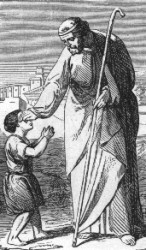
Saint Apollinaris
|

St. Apollinaris was the first bishop of Ravenna, and its only known martyr. His acts say that he was born at Antioch, a disciple of St. Peter, and made by him bishop of Ravenna, but this is an invention of the seventh century, when the pretensions of that see were in need of support. He was famous among the earlier martyrs, and the high veneration which the Church paid early to his memory is a sufficient testimony to his sanctity and apostolic spirit; but no reliance can be put in his legend. According to it he miraculously healed the wife of an official and converted her and her husband, cured one Boniface who was dumb, and made many converts, for which he was flogged and chased from the city; he preached the gospel in Bologna and converted the household of the patrician Rufinus, and was banished from thence and wrecked on the Dalmatian coast, where his preaching caused him to be ill-treated. Three time he returned to his see, and each time was captured, tortured, and driven out again; the fourth time the Emperor Vespasian issued a decree of banishment against Christians, and for a time Apollinaris lay in hiding with the connivance of a Christian centurion; but he was recognized and set upon by the mob at Classis, a suburb of the city, knocked about, and left for dead. St Peter Chrysologus, the most ollustrious among his successors, has left a sermon in his honor, in which he styles him martyr; but adds that God preserved him a long time to His Church, and did not suffer the persecutors to take away his life. So he may have been a martyr only by the torments he endured for Christ. The name of St Apollinaris occurs in the canon of the Milanese Mass.
St Peter Chrysologus in his sermons (no. 128) refers to St Apollinaris as first bishop of Ravenna and as a martyr. Beyond this we know very little. The life, printed in the Acta Sanctorum, July, vol. 5, is not of older date than the seventh century, and there is no reason to suppose it to be based on any genuine tradition. The subject has been fully discussed by Mgr Lanzoni in his essay Le fonti della leggenda di Sant' Apollinare di Ravenna (1915), and again in his book Le diocesi d'Italia ... (1923), pp. 455 seq., and see E. Will, S. Apollinaire de Ravenne (1936). Cf. also Delehaye, "L'Hagiographie ancienne de Ravenne" in Analecta Bollandiana, vol. xlvii (1929), pp. 5-30; Zattoni, La data della Passio S. Apollinaris (1904), with other later papers; M.G. Loreta, Le chiese di S. Apollinare (1924); and CMH., pp. 390-392.
Butler's Lives of The Saints, Herbert J. Thurston, S.J. and Donald Attwater
Nihil Obstat: PATRICIVS MORRIS, S.T.D., L.S.S., CENSOR DEPVTATVS.
Imprimatur: E. MORROGH BERNARD, VICARIVS GENERALIS
WESTMONASTERII: DIE XXIII FEBRVARII MCMLIII
|
|